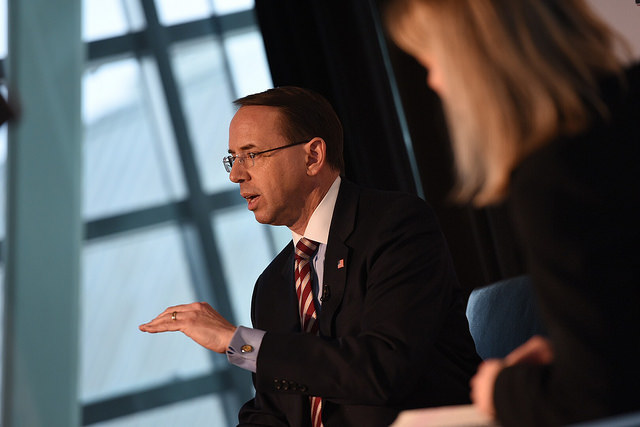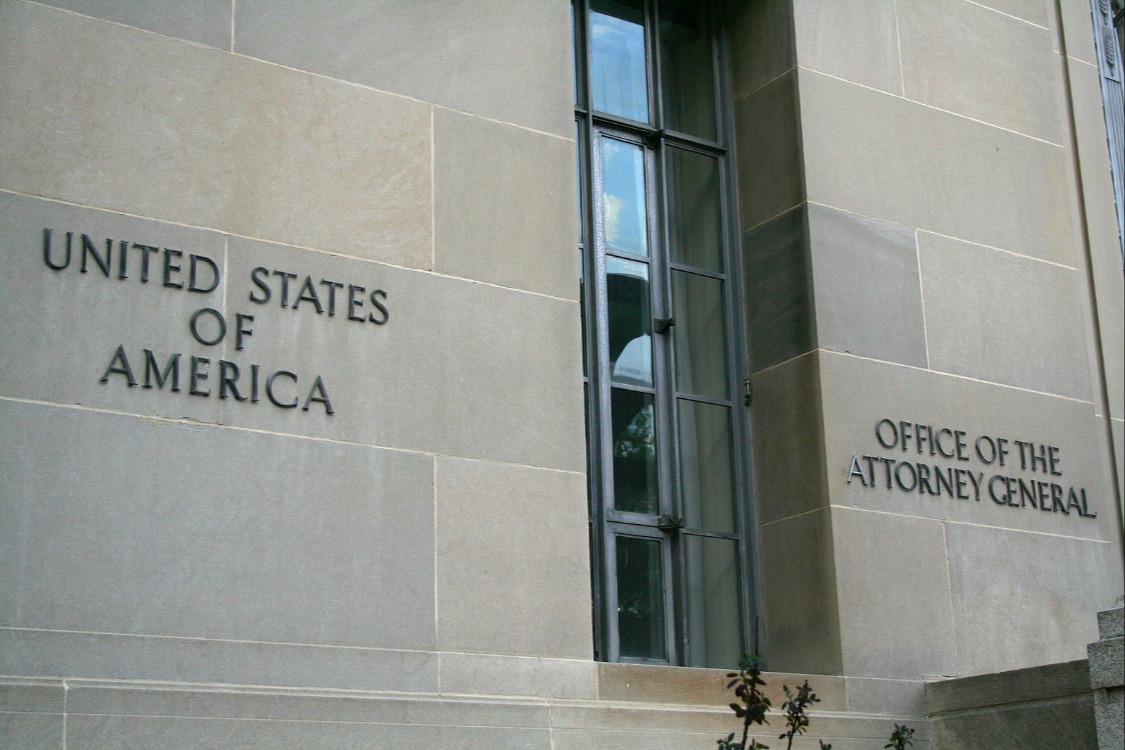Presidential Norms and the Special Counsel Investigation: Disclosures to Congress
Yesterday morning, President Donald Trump tweeted:
A Rigged System - They don’t want to turn over Documents to Congress. What are they afraid of? Why so much redacting? Why such unequal “justice?” At some point I will have no choice but to use the powers granted to the Presidency and get involved!

Published by The Lawfare Institute
in Cooperation With

Yesterday morning, President Donald Trump tweeted:
A Rigged System - They don’t want to turn over Documents to Congress. What are they afraid of? Why so much redacting? Why such unequal “justice?” At some point I will have no choice but to use the powers granted to the Presidency and get involved!
— Donald J. Trump (@realDonaldTrump) May 2, 2018
The president was weighing in on a drawn-out dispute between the Justice Department and a handful of Trump-aligned Republican lawmakers, who have successively requested a series of classified documents from the department and threatened Deputy Attorney General Rod Rosenstein with impeachment if he fails to provide them. In late April, under pressure, Rosenstein provided former FBI Director James Comey’s memos to the House Judiciary and Intelligence Committees. Now, as the New York Times and the Washington Post have reported, Republicans including Reps. Mark Meadows and Jim Jordan are requesting access to an unredacted copy of a Justice Department memo describing the scope of the Mueller investigation—and this time, the Justice Department has refused.
Now that Trump has drawn attention to these apparent congressional efforts to undermine the Mueller investigation, it’s a good time to review some legal, normative, and historical standards in an effort to measure how, once again, we may be boldly going where no one has gone before.
Let’s begin with a review of some legal and normative rules and standards governing various forms of information-sharing. These rules and standards apply to information shared between the executive branch and Congress and also to information shared within the executive branch. (For those who need a really deep dive into presidential norms, I can strongly recommend Daphna Renan’s excellent forthcoming article on the topic.)
Under several federal statutes, such as 50 U.S.C. § 3091, “[t]he President shall ensure that the congressional intelligence committees are kept fully and currently informed of the intelligence activities of the United States.” See also 50 U.S.C. § 3092. As I have explained in Chapter Two of “National Security Investigations and Prosecutions” (NSIP),
According to one report prepared for Congress, the “fully and currently informed” standard has its roots in the Atomic Energy Act of 1946; it was also part of the resolution establishing the Senate Intelligence Committee in 1976. The precise meaning of the “fully and currently informed” standard has been worked out by accommodation between the branches of government over time, but according to one account from a knowledgeable insider, “[b]y the time Ronald Reagan was inaugurated as President in 1981, working relations between the oversight committees and the agencies they oversaw were reasonably well established.”
The “fully and currently informed” standard applies specifically to the Foreign Intelligence Surveillance Act (FISA), where it is part of semi-annual or other periodic reporting requirements in 50 U.S.C. §§ 1808, 1826, 1846, 1862, 1881f, and 1885c.
In principle, both Congress and the President have tended to reserve their rights under the “fully and currently informed” standard. Examples of Presidential signing statements asserting presidential prerogatives are collected in NSIP, and several historical examples of Presidential refusals to provide information to Congress were described by the Office of Legal Counsel (OLC) in 1982. In its brief to the Supreme Court in American Foreign Service Ass’n v. Garfinkel, 490 U.S. 153 (1989), after a lot of dancing around due to the unusual procedural posture of the case, the Department of Justice ultimately argued in its brief that a federal statute was “unconstitutional to the extent it is interpreted ... to deprive the President of control over dissemination of [classified] information, including to Members of Congress”; that the statute “cannot constitutionally be applied to divest the president of all control over the decision whether to disclose national security information to Congress”; and that history “confirms that the Executive Branch may properly decline to grant Members of Congress access to national security information.” (Ultimately, the court did not decide the case on the merits.)
The executive branch also has been jealous of its prerogatives with respect to informing Congress about open investigations, particularly criminal investigations. In a letter sent to Rep. John Linder in January 2000—sometimes referred to as the “Linder Letter”— the Justice Department decided to “take this opportunity to present . . . for the benefit of both Members of Congress and the public at large . . . the Department's longstanding positions and practices on responding to congressional oversight requests.”
After reciting its respect and appreciation for congressional oversight, and the importance of back-and-forth accommodation between the two political branches of government, the Linder Letter pledged that the Justice Department’s “goal in all cases is to satisfy legitimate legislative interests while protecting Executive Branch confidentiality interests.”
The letter then cited several examples of confidential information, including
national security information, materials that are protected by law (such as grand jury information pursuant to Rule 6(c) of the Federal Rules of Criminal Procedure and taxpayer information pursuant to 26 U.S.C. § 6103); information the disclosure of which might compromise open criminal investigations or prosecutions or civil cases or constitute an unwarranted invasion of personal privacy; and predecisional deliberative communications (such as internal advice and preliminary positions and recommendations).
These categories of information, the letter explained, might not be fully available to Congress.
With respect to open matters, the Linder Letter did not mince words with respect to congressional objectivity:
Although Congress has a clearly legitimate interest in determining how the Department enforces statutes, Congressional inquiries during the pendency of a matter pose an inherent threat to the integrity of the Department’s law enforcement and litigation functions. Such inquiries inescapably create the risk that the public and the courts will perceive undue political and Congressional influence over law enforcement and litigation decisions.
This concern, the letter explained, “is especially significant with respect to ongoing law enforcement investigations,” as opposed to civil or regulatory matters. It cited Justice Robert Jackson and other attorneys general taking the same position and making similar assertions. It also cited a 1986 OLC opinion concerning limits on congressional requests for information regarding decisions made under the Independent Counsel Act—the ancestor of the current regulations governing special counsels like Robert Mueller.
The Linder Letter also argued, in terms only slightly less explicit, that Congress leaks like a sieve:
In addition to the problem of Congressional pressure and the appearance of such pressure, disclosure of documents from our open files could also provide a ‘road map’ of the Department’s ongoing investigations. The documents, or information that they contain, could come into the possession of the targets of the investigation through inadvertence or a deliberate act on the part of someone having access to them.
This anticipates the concerns of Justice Department and FBI leadership, expressed in yesterday’s Times article, that “some lawmakers [are] using their oversight authority to gain intelligence about [the Mueller] investigation so that it could be shared with the White House.”
Finally, the Linder Letter observed, disclosure of information on open matters (or closed ones) could also harm “the reputations of individuals mentioned in internal law enforcement and litigation documents . . . even though the case might ultimately not warrant prosecution or other legal action.” This is also the reasoning behind grand jury secrecy, a principle often recognized by the Supreme Court. And it is related to the norm that former FBI Director Jim Comey grappled with concerning the investigation of Hillary Clinton and her email server: Comey’s decision to explain the FBI’s reasoning on the case cut against the principle that law enforcement should not broadcast the conduct of a private citizen against whom charges will not be brought.
Even with respect to closed matters, the Linder Letter asserted the Justice Department’s “broad confidentiality interest in materials that reflect its internal deliberative process.” The letter asserted the usual reason for such confidentiality, which is to facilitate “open, frank and independent assessments of the pertinent law and facts—uninhibited by political and improper influences that may be present outside the Department”—i.e., in Congress. Quoting the Supreme Court’s opinion in United States v. Nixon, 418 U.S. 683, 705 (1974), the famous case involving President Richard Nixon’s assertion of executive privilege in the Watergate investigation, the letter said: “Human experience teaches that those who expect public dissemination of their remarks may well temper candor with a concern for appearances and for their own interests to the detriment of the decisionmaking process.”
Law enforcement and politics have had a similarly uneasy relationship within the executive branch. The Justice Department and the FBI are part of the executive branch, of which the president is the chief, and their leaders are the president’s subordinates, exercising aspects of the “executive Power” that is vested in him by the Constitution. If the president directed Justice Department and FBI leadership to focus on drug dealing rather than financial fraud, or on gun running rather than crimes against children, they would rightly be fired if they refused to obey his policies.
On the other hand, they would rightly be praised, and the president condemned, if they refused a presidential directive to prosecute this particular drug dealer because he is a Democrat, or this particular gun runner because she is a Republican. Richard Nixon showed us that level of intimacy between politics and law enforcement with his infamous “enemies list” which outlined ways to “use the available federal machinery,” like IRS audits, “to screw our political enemies.”
Since Nixon, every president, from Carter to Trump, has adopted policies limiting interactions between the White House and the Justice Department to protect the independence of prosecutorial decisions. The president may set law enforcement priorities and policies—but regardless of who occupies the White House, a bank robbery is still a bank robbery, and the American people have a reasonable expectation that crimes will investigated and prosecuted in keeping with the President’s constitutional obligation to “take Care that the Laws be faithfully executed.” That is why the United States Attorney’s Manual flatly “prohibits attorneys for the government from being influenced in making prosecution decisions” not only “by any subject's race, religion, sex, [or] national origin,” but also by “political association, activities or beliefs.” There is a real norm of Justice Department independence from the president in the context of individual criminal cases, a real departure from the theory of a unitary executive branch. As former White House Counsel Bob Bauer recently observed, there has been similar sensitivity, if not as much documentation, around White House interference in particular investigations or matters not involving the Justice Department.
However, there has always been room for broader interactions between the White House and the Justice Department on matters of national security. Trump’s memo on White House-Justice Department contacts says that
[f]requent communications between the White House and DOJ will be necessary on matters of national security and intelligence, including counter-terrorism and counter-espionage issues. Accordingly, communications that relate to urgent and ongoing national-security matters may be handled by specifically designated individuals. This exception does not relate to a particular contemplated or pending investigation or case absent written authorization from the Counsel to the President.
President Barack Obama’s memo contained similar language, as did President George W. Bush’s memo. (This is not to say that Trump has followed his own administration’s guidance, however.)
The demise of the FISA “wall,” which separated intelligence and law enforcement investigations, complicated the implementation of some of these norms to some extent. (I discuss this in Chapter Ten of NSIP.) But by and large, there has been a workable tradition of robust but not unlimited disclosure of classified intelligence (and counter-intelligence) information by the executive to the legislative branch, with some limitations particularly involving individual U.S. persons, and far more limited disclosure as to ongoing criminal investigations, especially when not related to the national security. There have also been significant limits imposed on White House involvement in ongoing investigations, with greater leeway in the area of national security.
Under current Justice Department regulations, the attorney general (or the acting attorney general) may appoint a special counsel to investigate where he or she suffers from a conflict of interest. As Richard Nixon showed, an investigation of the president is the classic example of such a conflict, precisely because the president is the attorney general’s boss. A special counsel is supposed to have a higher degree of insulation from that sort of political pressure, as well as “a reputation for integrity” and the experience necessary to ensure that his “decisions will be supported by an informed understanding of . . . Department of Justice policies.” (Strictly speaking, Bob Mueller appears to have been appointed under the organic Justice Department statutes rather than the Special Counsel regulations, as confirmed by his appointment order and in Mueller’s own legal pleadings, although he is expressly subject to certain of the regulations.)
A similar tension exists at the other end of the chain of command. Individual federal agents and prosecutors have political views, of course, and they remain free as citizens to express them on matters of public concern not pursuant to their official duties. It would be improper to discriminate against a federal career employee because of her political views. For example, it’s no secret that FBI Director Louis Freeh disliked President Bill Clinton and thought he had a damaged “moral compass,” or that some FBI agents harbored a “deep antipathy” to Hillary Clinton—but that alone would not disable them from doing their jobs.
However, law enforcement officials are expected to ignore politics and their personal views on other matters when executing their official duties. They are bound to enforce the law regardless of whether the suspect or defendant is a Democrat or a Republican. And in part to ensure the appearance of apolitical justice and enhance public confidence, they are limited by federal law and policy in what they can say and do while on duty or using government facilities. If they can’t abide by those limits, they can be reassigned or face other discipline. That is what happened to Pete Strzok, the FBI agent who was removed from Mueller’s team based on his text exchanges with another Bureau employee.
***
That’s the structure of rules and standards governing information-sharing between Congress and the executive and within the executive branch.Now let’s consider the unusual posture in which that framework is currently being applied.
As the Post and Times articles noted, Trump on May 2 tweeted as follows:
A Rigged System - They don’t want to turn over Documents to Congress. What are they afraid of? Why so much redacting? Why such unequal “justice?” At some point I will have no choice but to use the powers granted to the Presidency and get involved!
— Donald J. Trump (@realDonaldTrump) May 2, 2018
Prior tweets in the same vein include the following:
What does the Department of Justice and FBI have to hide? Why aren’t they giving the strongly requested documents (unredacted) to the HOUSE JUDICIARY COMMITTEE? Stalling, but for what reason? Not looking good!
— Donald J. Trump (@realDonaldTrump) April 7, 2018
So sad that the Department of “Justice” and the FBI are slow walking, or even not giving, the unredacted documents requested by Congress. An embarrassment to our country!
— Donald J. Trump (@realDonaldTrump) April 2, 2018
The top Leadership and Investigators of the FBI and the Justice Department have politicized the sacred investigative process in favor of Democrats and against Republicans - something which would have been unthinkable just a short time ago. Rank & File are great people!
— Donald J. Trump (@realDonaldTrump) February 2, 2018
In addition, on Nov. 2, 2017, the President told a radio talk-show host that “he was ‘very unhappy’ with the Justice Department and lamented the political norms that maintain a separation between the president and federal law enforcement. ‘The saddest thing is, because I am the president of the United States, I am not supposed to be involved with the Justice Department,’ Trump [said]. ‘I’m not supposed to be involved with the FBI. I’m not supposed to be doing the kind of things I would love to be doing and I am very frustrated by it. It’s very discouraging to me. I’ll be honest, I’m very unhappy with it, that the Justice Department isn’t going … maybe they are, but you know, as president — and I think you understand this — as a president you’re not supposed to be involved in that process.’”
These presidential statements are strange in many ways. First, they recognize a norm against presidential interference not only with respect to investigations, but implicitly with respect to the current document disputes—at least insofar as the president hasn’t yet stepped in at the Justice Department with respect to something he obviously cares about deeply. But the May 2 tweet also contains an explicit threat at any time to breach that norm and “use the powers granted to the Presidency and get involved!” This is similar to other market-testing previously conducted by presidential tweet or statement. Perhaps another cycle of panicked reaction—i.e., publicly-expressed opposition—will deter him.
Second, the tweets don’t make clear the norm that is in question. As discussed above, there is a strong general norm against presidential influence over Justice Department investigations. But the same is not necessarily true with respect to presidential influence over the Justice Department providing information to Congress about investigations. In that latter area, in fact, the opposite seems closer to the truth, which may have profound consequences.
The norms permitting presidential involvement apply slightly differently with respect to classified information and information subject to executive privilege. With respect to classified information, there is a tradition of presidential consultation with departments and agencies before declassifying, but no one doubts the president’s prerogative if he or she decides to get involved. The Supreme Court describes presidential authority here in very personal terms, relying on the Commander-in-Chief Clause of the Constitution. See, e.g., Dep’t of the Navy v. Egan, 484 U.S. 518, 527 (1988). It would not be at all unprecedented or untoward for the president or other White House officials to participate and exert some influence in a declassification process. The same is probably true with respect to an agency’s refusal to provide classified information to properly cleared members of Congress acting within their oversight jurisdiction: the White House would properly want to be informed and weigh in before an agency did something that might trigger a constitutional showdown.
The same is true with respect to executive privilege, perhaps to an even greater degree. The Supreme Court has discussed executive privilege in personal terms regarding the president (although that is understandable, because the Nixon case literally involved Presidential communications). More importantly, President Ronald Reagan’s official policy was that only the president could assert executive privilege, and most other modern presidents seem to have followed that approach as a formal or informal matter. (For a very interesting historical review of modern executive privilege, see Mark J. Rozell, Executive Privilege and the Modern Presidents: In Nixon’s Shadow, 83 Minn. L. Rev. 1069 (1999).)
In the Operation Fast and Furious controversy, Attorney General Eric Holder did not assert executive privilege, but instead wrote a letter to Obama requesting that Obama assert the privilege—which he did. (To be sure, the congressional subpoena in Fast and Furious was for documents created “in the course of [the Justice Department’s] deliberative process concerning how to respond to congressional and related media inquiries into that operation,” rather than for documents pertaining to the operation or investigation itself, but that was not dispositive. Holder almost surely would not have asserted executive privilege without presidential approval even for documents pertaining to an ongoing investigation of particular individuals.)
The norm restricting presidential action with respect to congressional demands for Justice Department documents today does not concern influence over investigations, but instead conflicts of interest. Trump should not influence the Justice Department’s decision on whether to provide documents to Congress—not because the documents pertain to an investigation, but because they pertain to an investigation of Trump (and/or his close associates). That may be especially true in light of some of the prior shenanigans involving the White House and the House (specifically, House Intelligence Committee Chairman Devin Nunes) with respect to the Carter Page FISA warrant and related matters. As noted above, the Times reports that senior officials at the Justice Department and the FBI believe that members of the House are acting as a kind of cat’s paw for the president.
The difficulty, however, is that while norms may counsel or compel presidential inaction, with respect to the assertion of executive privilege there may be a need for presidential action. Is there a norm affirmatively requiring the president to follow the advice of his acting attorney general and assert executive privilege against his personal preference when he suffers from a conflict? That seems unlikely—the best one could hope for is probably presidential silence (or perhaps if there were a formal recusal, the vice president’s decision on the matter). Could the acting attorney general successfully assert executive privilege against a congressional subpoena in the face of presidential silence? What would happen (in court or otherwise) in such a case? What would happen if the president, despite any applicable norms, filed a brief or statement (or tweet) expressly disclaiming executive privilege with respect to the documents in question?
These and other questions may provide many hours of amusement for OLC and the legal academy. But here and now they show why Rod Rosenstein is in a very tough position, and why he may feel compelled to lean in favor of disclosure to Congress, even if he will not provide every document the House has demanded. Historically, an appeal to House leadership might have helped, because leadership has historically been somewhat more respectful of tradition, but Rosenstein has apparently already tried that and failed. To properly resist a full-powered congressional onslaught, a federal agency needs active support from the White House, not grudging inaction with periodic threats to pull the rug. One of the features of a system of separated powers is that the president can accomplish a great deal with the support of Congress, or even an energetic minority of Congress (and the passivity of the remainder). Where the president is disabled by a conflict of interest and uses members of Congress to fight a proxy war against his own subordinates, however, the feature might be seen by some as a bug.
The more that Rosenstein accedes to congressional demands for investigative information, the more he erodes the norms expressed in the Linder Letter. This will have consequences in the long run unless it is reversed. If the Trump era is seen in hindsight as a brief but severe fever, perhaps its precedents will have little impact in the ongoing struggle between the political branches. But in the near term, every disclosure of classified information will also resonate through the Freedom of Information Act. In court, the Justice Department has tried at times to reduce the impact of particularly fevered presidential tweets, but generally without much luck. So it will be interesting to see how today’s disclosures to Congress are dealt with in the future.





